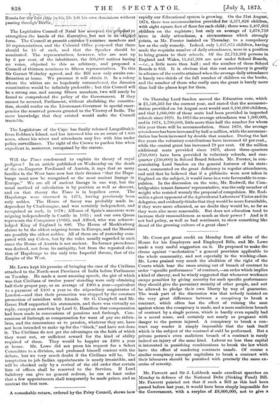Mr. Cross got great credit on Monday from all sides
of the House for his Employers and Employed Bills, and Mr. Lowe made a very useful suggestion on it. He proposed to make the clause against "molestation" a general provision applicable to the whole community, and not especially to the working-class. Mr. Lowe praised very much the abolition of the right of the Courts which hear the cases arising out of breach of contract to order "specific performance" of contract,—an order which implies a kind of slavery, and he wisely suggested that whenever workmen escape penalties by giving security for such specific performance they should give the pecuniary security of other people, and not be allowed to pledge their own liberty by way of guarantee. The weak part of the discussion was that nobody insisted on the very great difference between a conspiracy to break a contract, which often has the effect of ruining the man against whom the conspiracy is made, and a mere malicious breach of contract by a single person, which is hardly even equally bad in a moral sense, and certainly not nearly so pregnant with danger to the person injured. A conspiracy to break a con- tract 'may render it simply impossible that the task itself which is the subject of the contract slould be performed. But a private person's even malicious breach of a contract is rarely indeed an injury of the same kind. Labour no less than capital is interested in punishing combinations to break the law which have the effect of rendering contracts unsafe. Of course a similar conspiracy amongst capitalists to break a contract with their labourers should be punished with precisely the same ex- ercise of severity.


































 Previous page
Previous page